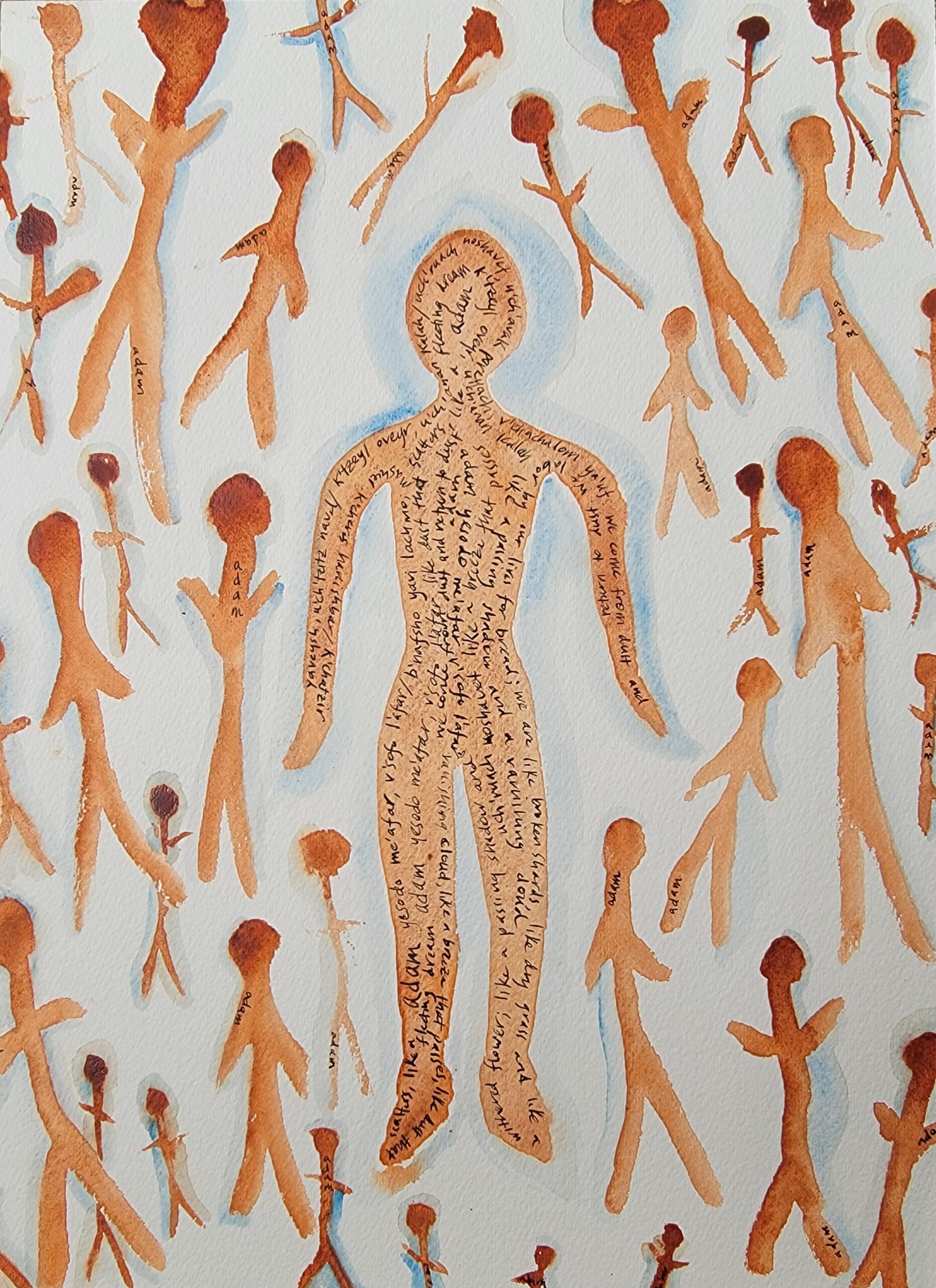
adam(ah), watercolor and ink on Arches coldpress
Cultivating inner freedom is an important aim of transformational work. In 1941, social psychologist and humanistic philosopher Erich Fromm wrote about the choice that humans can make to “unite…with the world in the spontaneity of love and productive work or else to seek a kind of security by such ties with the world as destroy…freedom and the integrity of…individual self.” Difficult times create the conditions where we can consciously work to make such choices, and also have the potential to overwhelm us.
May each and all of us keep our connection to joy, freedom, and the fullness of our humanity as we wade through these challenging waters together.
The Forces that Push Us Toward Disembodiment and Disorientation
“When Fascism came into power, most people were unprepared, both theoretically and practically. They were unable to believe that man could exhibit such propensities for evil, such lust for power, such disregard for the rights of the weak, or such yearning for submission.”
– Erich Fromm, Escape From Freedom
Times like these literally make us lose our minds, and then fear becomes a portal for hijacking our emotions and instincts. Our natural tendency to identify with those who seem most like us can be weaponized to support the will of those who are invested in domination.
The philosophy of domination promotes the fantasy that there is some escape from the conditions of humanity; that there is a pure state and a rightful hierarchy that can soothe our existential anxiety. The unwillingness to accept being a creature in a mortal body motivates a quest for power and autonomy that becomes focused on stamping out the reminders of humanity in others. Instead of honoring the gift of life that we’ve been given, domination philosophy invites us to corrupt our vessel, forget what matters, abandon thinking for ourselves, and become like a zombie or a ghost, acting on behalf of death and destruction.
Waking Up to The Fleeting Gift of This Life

autumn in nj
The holiday of Yom Kippur, which was just over a month ago, is a time to actively contemplate mortality and to become aware that life in the coming year is not a guarantee. On that day, there is a liturgical poem that is read which lays out all of the ways that one might pass from this embodied life (nb: the Leonard Cohen song Who By Fire is based on this). The heart of it is this:
“We come from dust, and return to dust
We labor by our lives for bread; we are like broken shards,
Like dry grass and like a withered flower,
like a passing shadow and a vanishing cloud,
like a breeze that passes, like dust that scatters, like a fleeting dream.”
The word that is used for dust is “adam,” from “adamah,” which means earth. In the Hebrew bible, “Adam” with a capital A is the name of a specific human, and “adam” means humanity – these beings we are, made of clay, that all too quickly return to dust.
I had a visceral encounter with this sensibility a few weeks ago. I was in a breathwork session where I experienced that half of my body was sinking into a dark, red clay, and the opposite arm was desperately trying to rise out of it. It took a bit of time for the energy to equalize, for the support of the clay to filter over to the other side and allow it to settle. Being supported by the substantive and warming nature of the clay helped me to relax into the sense of humility and vulnerability that part of me was desperately trying to avoid.
Strengthening Your Vessel

kaaterskill creek, ny
This week, a participant in an Enneagram workshop asked me what she could do as a Withdrawn type to deal with the overwhelm of information and emotions she’s feeling right now. My answer was the one that is usually given to this question: As a Withdrawn type, you can’t change the porousness of your being, but you can strengthen the vessel of your body. Being more present in the body guides choices about when to open and close your boundaries and creates a holding for whatever you are experiencing, whether it’s anger, grief, fear or something else.
In a way, the volume and intensity of what’s happening in the world is pushing many of us toward feeling like Withdrawn types. Personally, I keep working to remember to sink into the substantiality of this body and this Earth, the movement of this breath, and to connect with other bodies who are trying to stay awake in these difficult times. To keep building the capacity to stay connected to something that feels meaningful and abiding when the mind is terrified, to stay connected to the potency of my humanity.
This is a starting point to stabilize an orientation to a deeper ground as the world churns.
Fulfilling the Promise of the Enneagram Through Experiential Practice
If you missed my talk on this year’s Enneagram Global Summit, you can watch it here. The philosophy that I’m speaking about and demonstrating in this video is intimately connected to what I’ve written above.
As brilliant as the head center is, ideas and speaking cannot bridge the difficulties of this world without the support of the other two centers. Very little that we say matters unless people can relax in our presence and feel our hearts.
“Fulfilling the Promise of the Enneagram Through Experiential Practice” is about how the richness and complexity of the Enneagram fully comes to life only when we learn to inhabit the three centers of intelligence. I talk a bit about Freedom and guide some practice that you may find useful. You’ll learn:
- Why cognitive knowledge of the Enneagram – a one-centered approach – is not sufficient for transformation
- How experiential practice fosters empathy, which helps us to be more generous and skillful with ourselves and others
- A practice to begin to experience each center in its own language
For more practice and orientation, check out Accessing Your Inner Guidance in Chaotic Times, a video I recorded a few years ago that continues to be relevant today.
This interview is part of the Enneagram Global Summit, a free online event. This recording is a copyright of The Shift Network. All rights reserved.
artwork + images ©Julie Harris